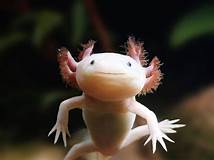Can You Have a Pet Axolotl?
Axolotls, also known as Mexican walking fish, are unique and fascinating creatures that have captivated the hearts of many aquarium enthusiasts. These creatures, native to the lakes and canals of Mexico City, exude an almost mythical aura with their feathery gills and ability to regenerate lost limbs. While their allure is undeniable, prospective pet owners must carefully consider whether an axolotl is the right choice for them.

Can You Keep an Axolotl as a Pet?
The answer to this question is a nuanced yes. The legality of owning an axolotl as a pet varies from region to region. In some areas, such as the United States, axolotls are classified as exotic animals and may require a permit or license to own them. It is crucial to research and comply with all local regulations before bringing an axolotl into your home.
Even if owning an axolotl is legal in your area, there are several factors to take into account. These creatures can live for up to 15 years in captivity, so you are making a long-term commitment. Furthermore, they require specialized care and a specific environment to thrive. If you are not prepared to meet their unique needs, it is better to reconsider getting an axolotl as a pet.
What Are the Requirements for Keeping an Axolotl Pet?
If you are convinced that an axolotl is the pet for you, there are several things you need to ensure before bringing one home.
Tank and Environment
Axolotls require a specific tank setup to thrive. They are aquatic creatures and need a spacious tank with at least 20 gallons of water. The tank should include a sandy or fine-gravel substrate, dense vegetation for hiding and resting, and a water filtration system. Axolotls are sensitive to water quality, so regular water changes and testing are essential. Additionally, they prefer cool water temperatures between 60°F and 68°F (16°C and 20°C).
Food and Diet
Axolotls are carnivorous and primarily feed on live or frozen foods. Common diet items include earthworms, bloodworms, brine shrimp, and small fish. They should be fed 1-2 times per day, depending on their age and size. It is important to avoid overfeeding, as axolotls are prone to obesity.
General Care
In addition to the tank setup and diet, axolotls require general care to stay healthy. They need regular health checks, including monitoring their weight, skin condition, and behavior. It is also important to provide them with hiding spots and enrichment items to keep them stimulated and happy. Axolotls are generally peaceful creatures, but they can become stressed by overcrowding or improper care, which can lead to health problems.
By providing your axolotl with a suitable environment, proper nutrition, and general care, you can help ensure that it thrives in captivity. However, it is crucial to remember that axolotls are not low-maintenance pets and require a significant commitment to their well-being.
Declaration: All article resources on this website, unless otherwise specified or labeled, are collected from online resources. If the content on this website infringes on the legitimate rights and interests of the original author, you can contact this website to delete it.




